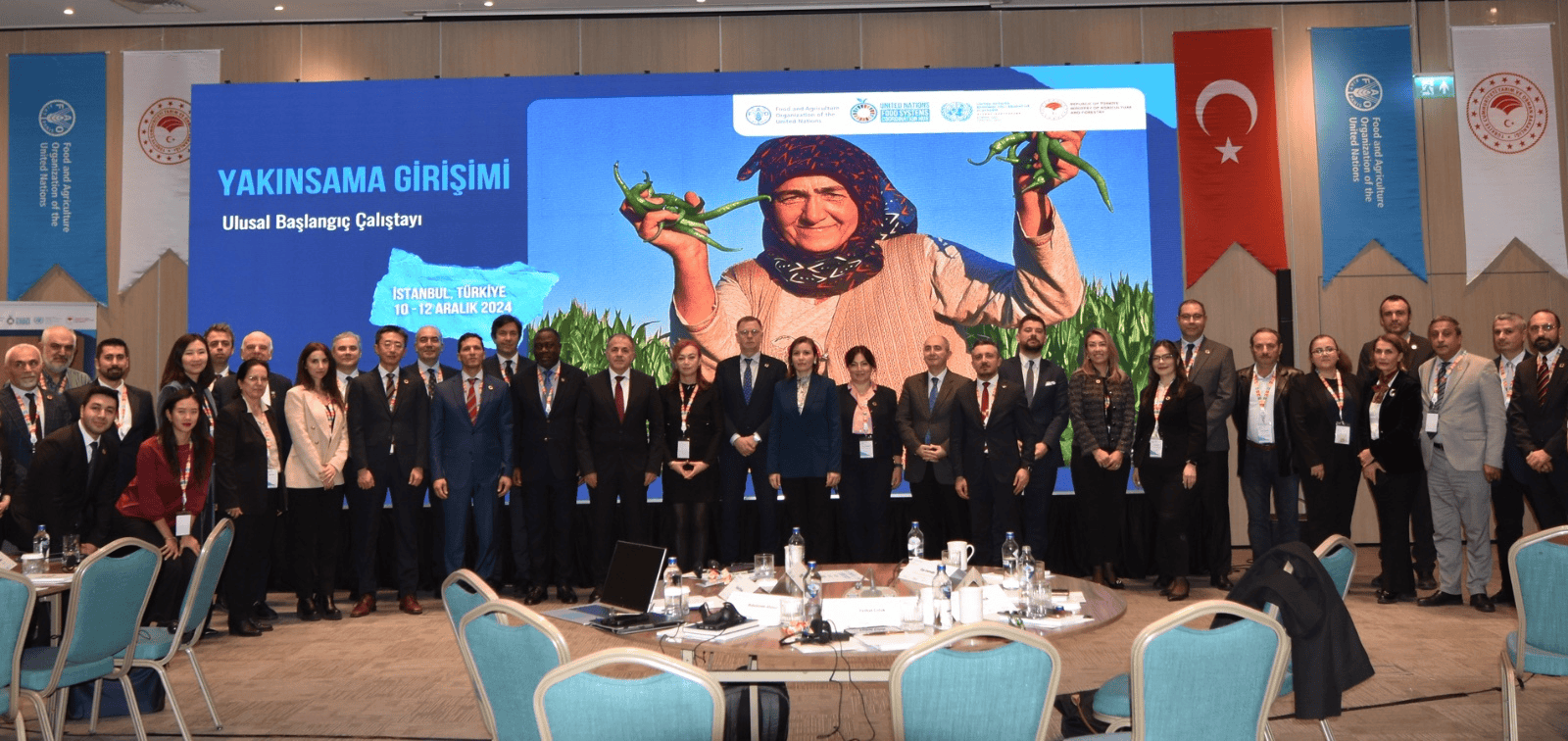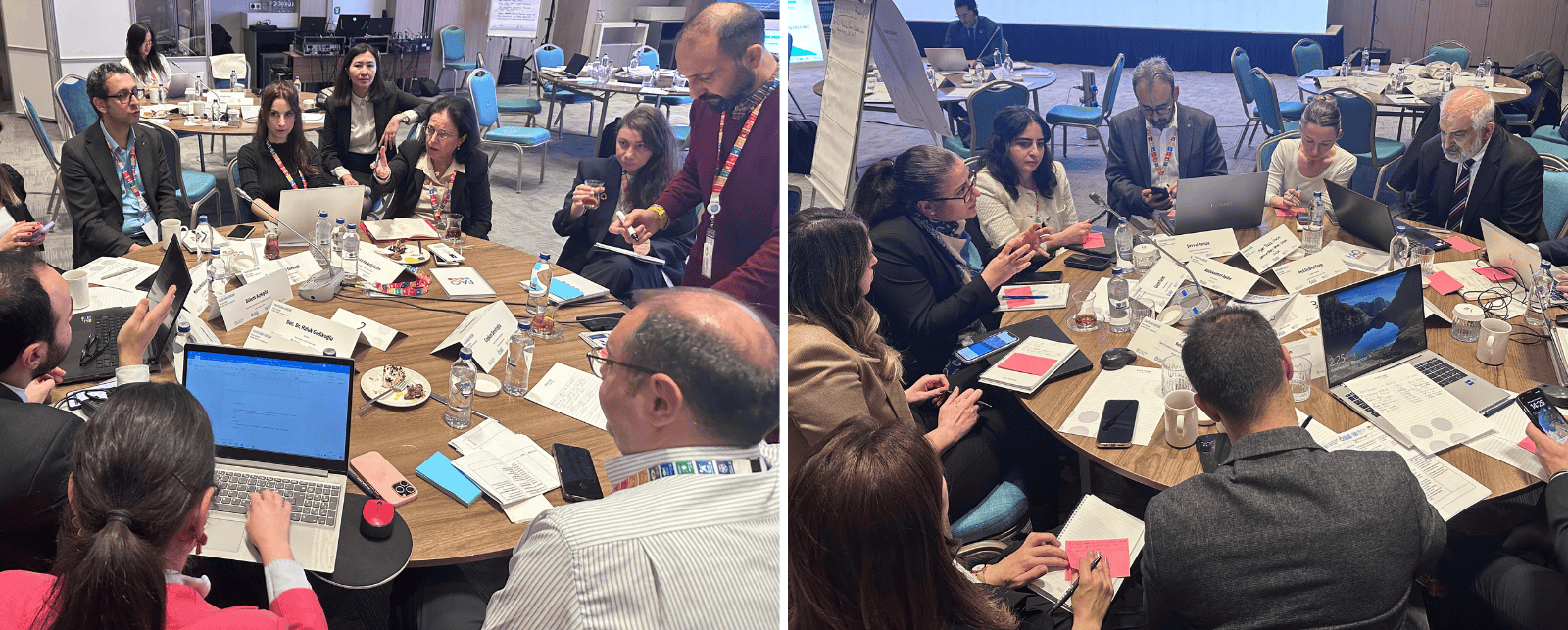Experts gather in Türkiye to align strategies for food systems and climate action
Convergence Initiative Inception workshop brings diverse stakeholders to Türkiye to craft a strategic blueprint for uniting food systems transformation with climate action.

Agriculture is a fundamental pillar of the economy and society in Türkiye, employing 15 percent of the people and contributing 7 percent to the gross domestic product.
A global leader in food production, Türkiye faces mounting challenges from water scarcity and other climate change-related issues that threaten the country’s agricultural sustainability and food security.
“Although Türkiye is responsible for only about 1 percent of global greenhouse gas emissions, it is in the Mediterranean basin, one of the regions most affected by climate change,” said Tuğba Dinçbaş, Deputy Director of Climate Change at the Ministry of Environment, Urbanization and Climate Change. “This poses a critical challenge for the country.”
Türkiye recently played host to the three-day Hub Convergence Initiative Inception Workshop to address these challenges.
“This workshop presents a valuable opportunity to enhance our strategies,” said Ferhat Çolak, the National Food Systems Convenor from the Ministry of Agriculture and Forestry in Türkiye. “In the context of aligning the national food systems road map with our climate plans, achieving the targets set out in our nationally determined contributions holds significant importance.”
The workshop, convened through a collaboration of the Food Systems National Convenor Office at the Ministry of Agriculture and Forestry, the United Nations Food Systems Coordination Hub, the FAO Country Office in Türkiye, and the United Nations Issue-Based Coalition on Sustainable Food Systems, brought together diverse stakeholders – from ministries and academia to the private sector and civil society – to co-design a Convergence Action Blueprint. This strategic document aims to align the country’s food systems transformation and climate action agendas while advancing sustainable development.
“The Convergence Initiative offers a platform to advance Türkiye’s national priorities, along with global aspirations and commitments like the Sustainable Development Goals and the Paris Agreement,” said Khaled Eltaweel, Programme Coordinator at the United Nations Food Systems Coordination Hub. “Through collaborative dialogue and innovative solutions, we can deliver a blueprint that reflects Türkiye’s leadership and determination.”
Laying the groundwork
The country’s commitment to sustainable food systems transformation began with the 2021 release of its “Towards Sustainable Food Systems: National Pathway of Türkiye”. As a pilot country for the Convergence Initiative, launched in mid-2024 by the United Nations Food Systems Coordination Hub, Türkiye focuses on leveraging the interface between food systems and climate action.
“Türkiye, with its unique geographical and climatic diversity, stands at the intersection of opportunities and challenges,” said Ayşegül Selışık, Assistant FAO Representative in Türkiye. “As a country, we are both a vital contributor to regional food security and highly vulnerable to the adverse impacts of climate change.” Selışık highlighted rising temperatures, shifting precipitation patterns and increasing droughts as pressing concerns threatening agriculture, water resources and rural livelihoods.
At the workshop, participants discussed the climate strategies in Türkiye, including climate-smart agriculture, reducing food waste, promoting organic farming and achieving net zero emissions by 2053. The integration of renewable energy and advanced technologies into agriculture was reinforced as a priority alongside strengthening agricultural insurance frameworks like the Agricultural Insurance Pool (TARSIM) to protect farmers from climate-induced risks.
Confronting challenges
Discussions revealed the stark realities of food systems in Türkiye: rising temperatures, declining precipitation, significant food losses and concerns about dietary shifts. The increasing use of fertilizers and pesticides has exacerbated greenhouse gas emissions, while extreme weather events – numbering up to 1 475 in the past year – have reduced crop yields and increased economic losses. Climate projections predict further declines in productivity by 2080, with Türkiye warming at a rate above the global average.
Shaping the Convergence Action Blueprint
The well-being of people, the livelihoods of farmers and the health of the planet were central to the workshop’s discussions. Participants stressed the importance of decentralized collaboration, robust data management systems, adequate financing and targeted policy instruments to support sustainable agricultural practices. Building the capacities of farmers and cooperatives and fostering innovation in the private sector were identified as critical measures for adapting to climate challenges.
“Participants engaged fully throughout because they recognized the urgency and importance of bringing together food systems and climate action at local and national levels,” said David Nabarro, Strategic Director of the 4SD Foundation, which works to build connections in the areas of food, nutrition, climate, nature and health and serves as a strategic advisor to the Convergence Initiative. “They were committed to concluding with an ambitious implementable blueprint for convergent working.”

Keigo Obara, a member of the Issue-Based Coalition on Sustainable Food Systems secretariat, highlighted the fundamental nature of the work needed.
“The transformation we seek is not simply an agricultural issue,” he said. “It’s a systemic challenge. We need transformative change for more sustainable food systems that assure food security and access to healthy diets for all, which integrates climate resilience, biodiversity protection, public health and economic development with particular attention to rural communities and vulnerable groups and women’s economic empowerment and gender equality.”
A convergence working group – chaired by the Food Systems National Convenor Office and supported by United Nations agencies – will be established to ensure the effective implementation of the blueprint.
“Following the launch of the Convergence Initiative by the Food Systems Coordination Hub in 2024 and the selection of Türkiye as one of the pilot countries,” said Babatunde Ahonsi, United Nations Resident Coordinator in Türkiye, “we, as the United Nations system in Türkiye, are ready to support the Government of Türkiye to integrate the national food systems transformation and climate action agendas in collaboration with the respective partners and stakeholders.”
